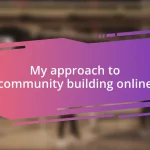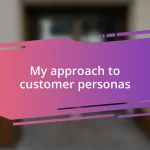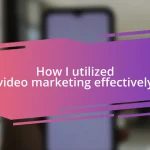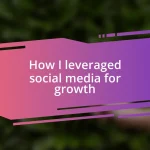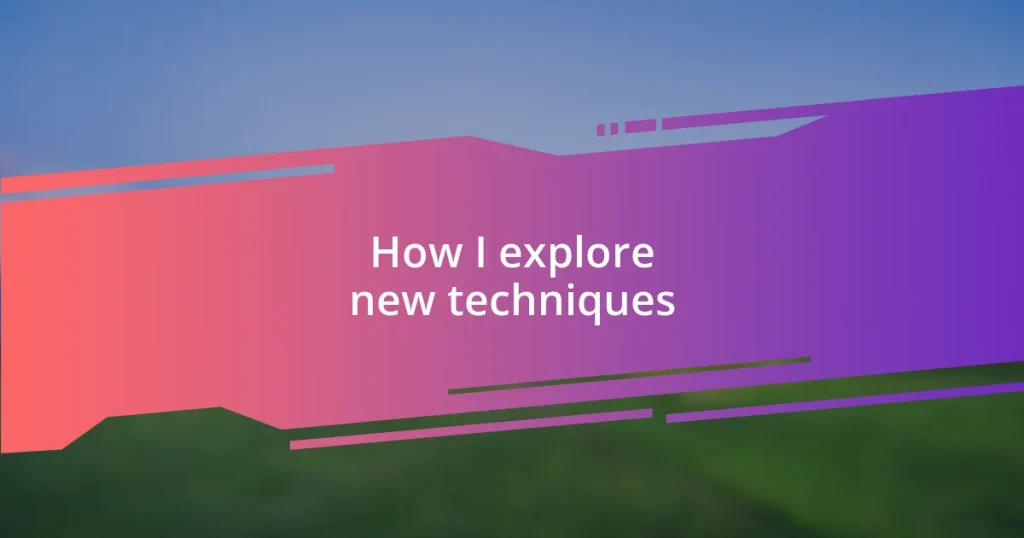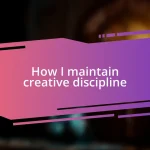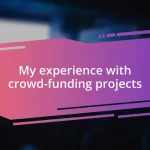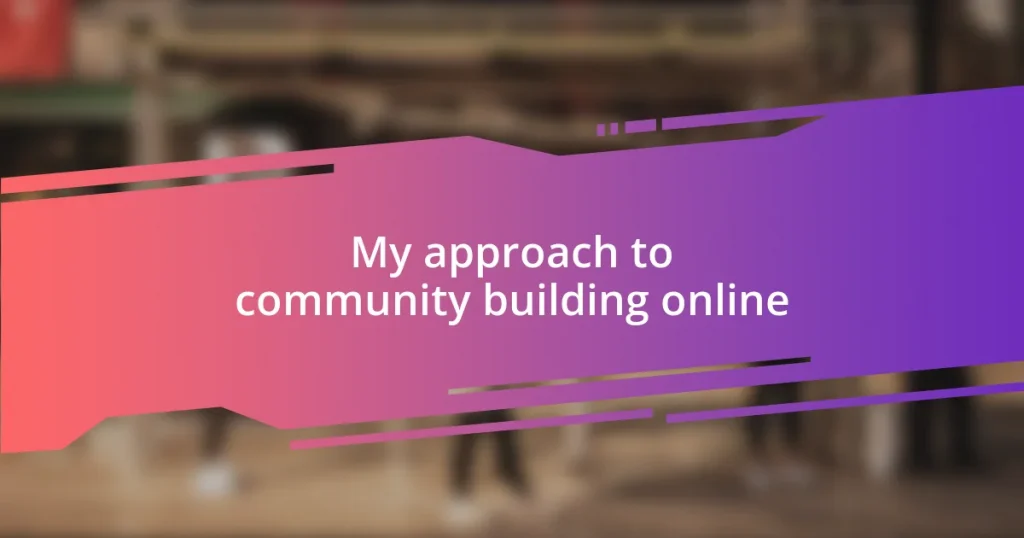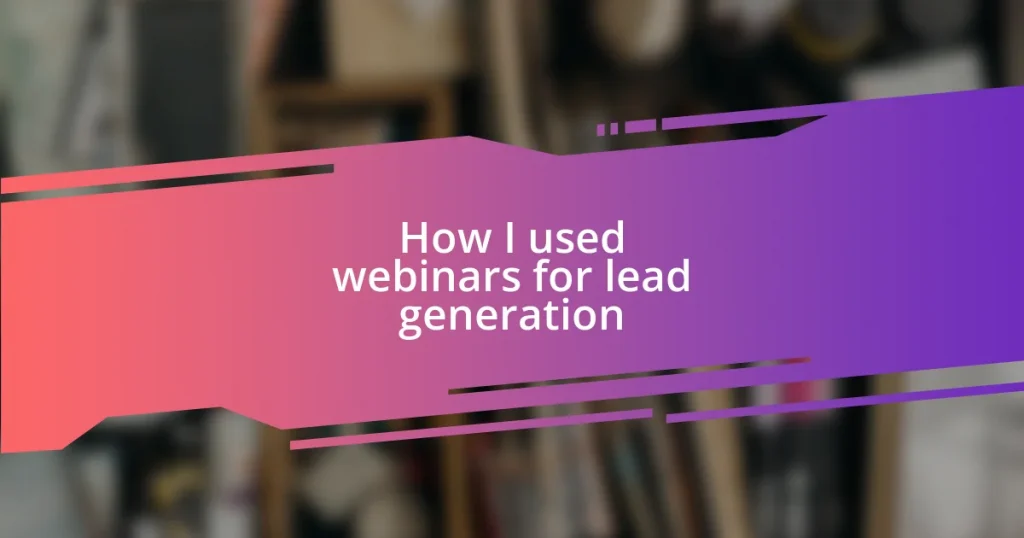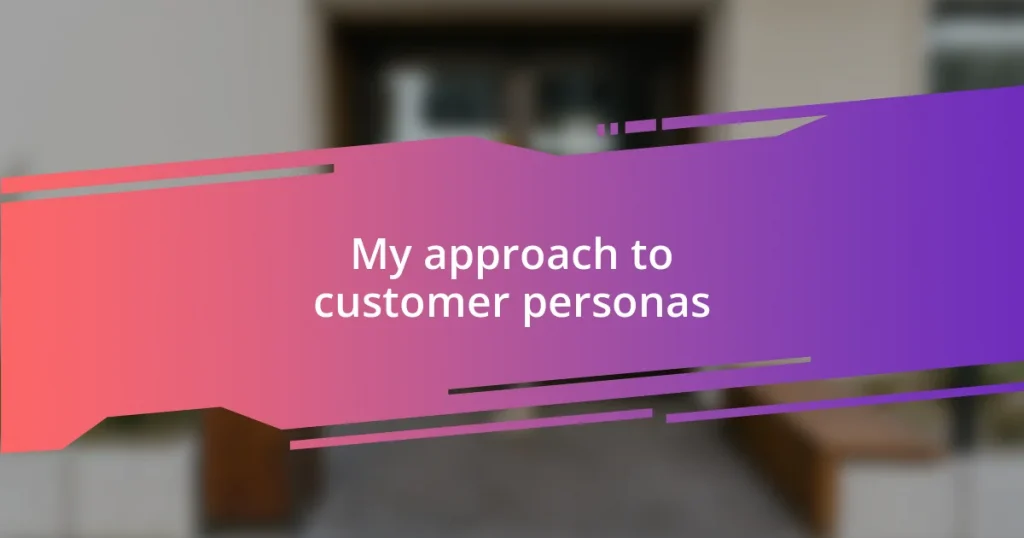Key takeaways:
- Hands-on and experiential learning enhances understanding and retention of concepts.
- Seeking feedback and self-reflection help identify areas for improvement and foster growth.
- Setting specific goals and regularly applying new techniques in real scenarios drive motivation and deepen learning experiences.
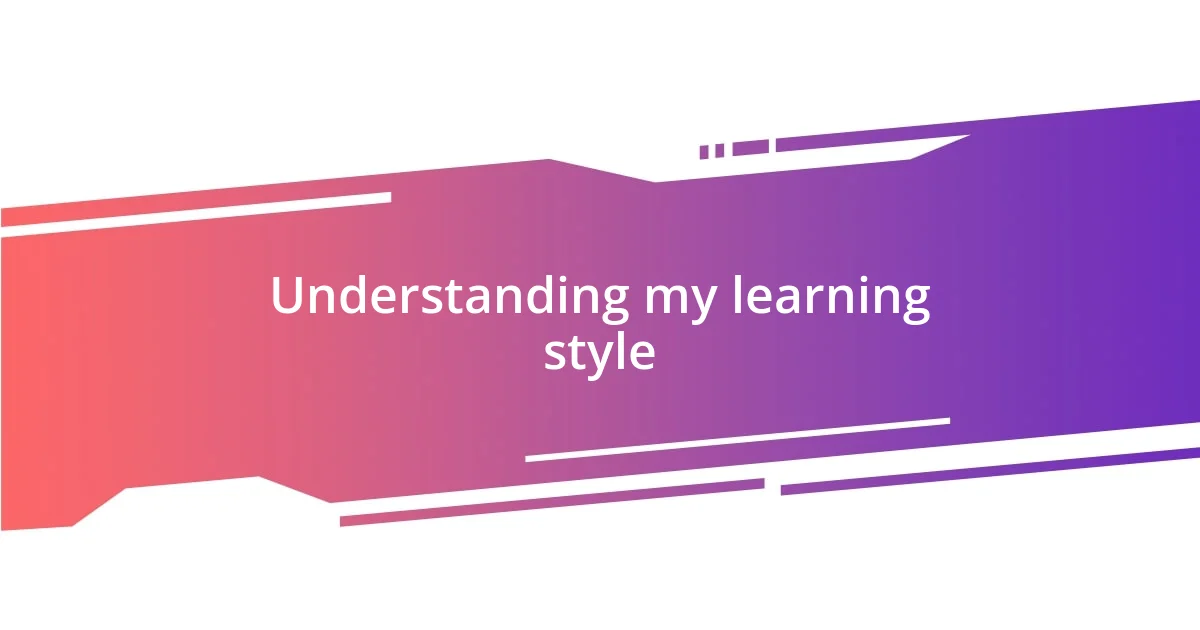
Understanding my learning style
Understanding my learning style has always been a journey of discovery. I remember a time when I struggled to grasp new concepts in a lecture-heavy environment; it left me feeling overwhelmed and frustrated. It didn’t click until I started to realize that I learn best through hands-on experience.
I often find myself reflecting on how I absorb information best. For instance, during a recent workshop, I engaged in a project-based task that allowed me to apply theories in real-time. The sense of accomplishment I felt as I connected theoretical insights with practical application was a revelation. Why do we often underestimate the power of experiential learning?
When I began seeking out creative methods—like visual aids and collaborative discussions—I noticed significant changes in my retention and understanding. I still remember the thrill of using a mind map to untangle complex ideas; it felt like discovering a secret code that opened the door to deeper comprehension. Does anyone else feel that spark of inspiration when they find a technique that resonates?
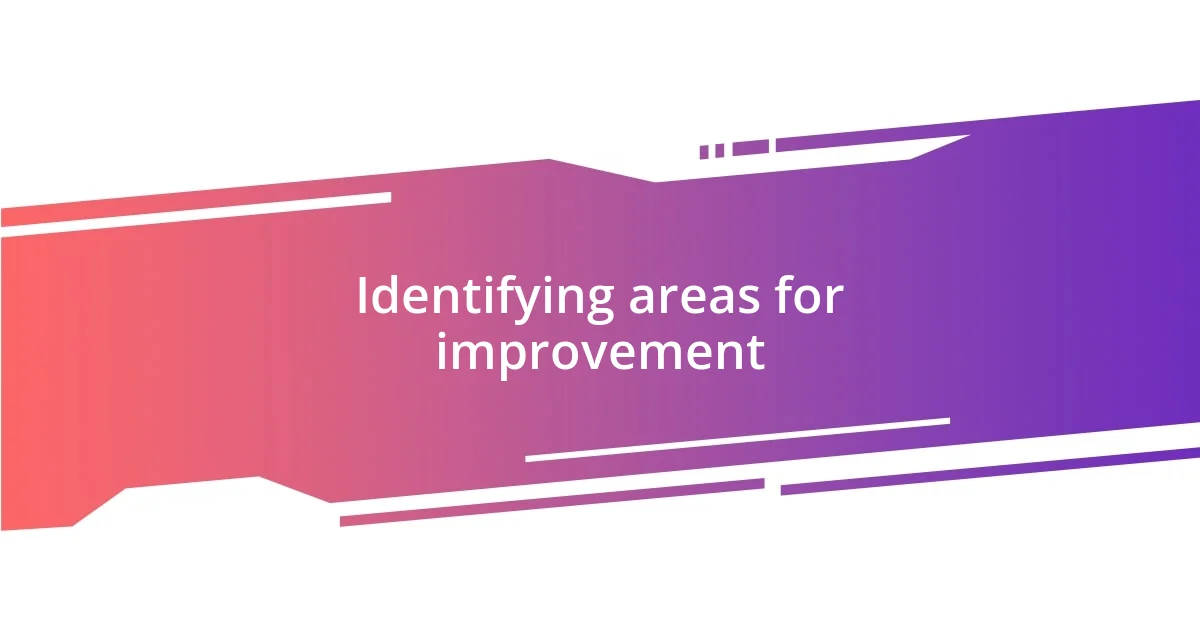
Identifying areas for improvement
Identifying areas for improvement is crucial for growth. I’ve often found that the first step is self-reflection, which helps reveal patterns in my learning journey. For instance, I once noticed that I struggled during certain presentations because I didn’t engage with the material. This realization pushed me to actively participate in discussions, and I experienced a notable uptick in my grasp of the subject matter.
Another technique I use involves soliciting feedback from peers and mentors. I remember a time when a colleague pointed out that I sometimes rush through complex topics, glossing over vital aspects. This feedback was hard to hear at first, but it motivated me to slow down and explain concepts more thoroughly. The growth I’ve experienced from embracing constructive criticism has been invaluable.
Lastly, I like to track my progress over time. By keeping a journal of my learning experiences, I can pinpoint what techniques yield the best results. One memorable entry highlighted my shift from traditional note-taking to a more interactive method that included doodling concepts. This approach not only made studying enjoyable but also helped solidify my understanding. Can you recall a time when a small change made a big difference in your learning?
| Technique | Area of Improvement |
|---|---|
| Self-Reflection | Understanding engagement with material |
| Feedback from peers | Improving depth of explanations |
| Progress Tracking | Identifying effective learning strategies |
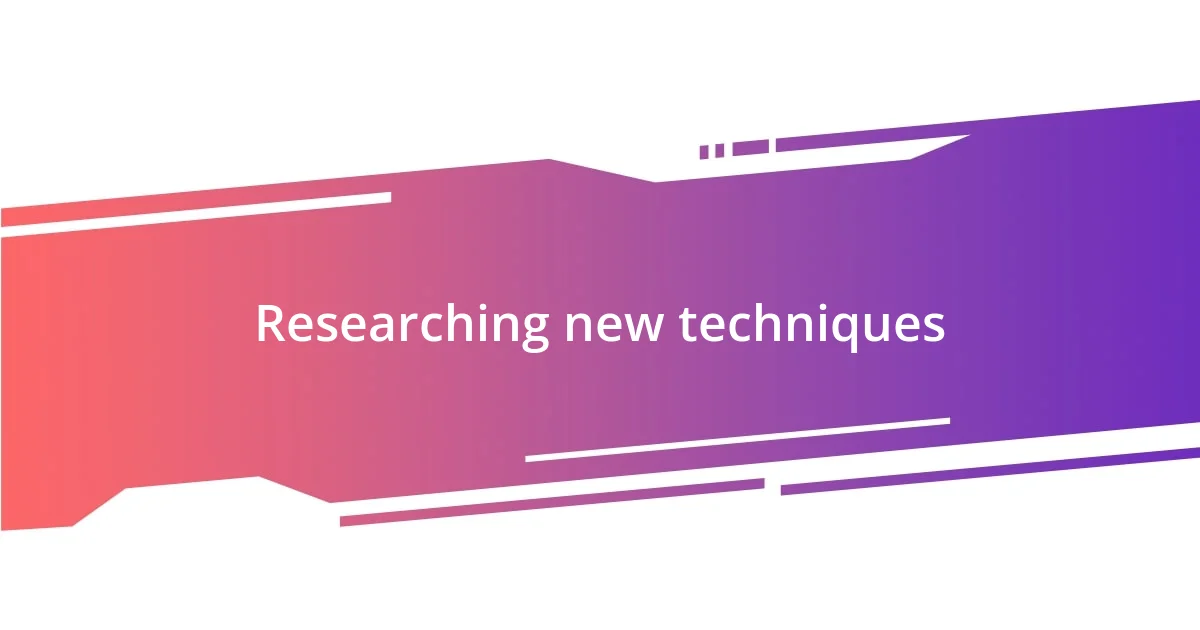
Researching new techniques
Researching new techniques is an exhilarating part of my learning process. I often find myself diving into online resources, from articles to videos, where experienced professionals share their insights. There’s something about discovering a technique that feels like uncovering a hidden gem. For example, I stumbled upon a podcast where experts discussed the Pomodoro Technique, and it instantly intrigued me. This method of breaking study time into manageable intervals seemed manageable, and applying it transformed my productivity dramatically. Has anyone else felt that rush when a new idea sparks your curiosity?
In my quest for new learning methods, I often compile a list of resources and techniques that resonate with me. Here’s what I usually focus on:
- Online Workshops: Immersive environments where I can interact and ask questions.
- Social Media Groups: Platforms like Facebook or LinkedIn, where communities share their experiences.
- YouTube Tutorials: Visual demonstrations that help solidify my understanding quickly.
- Books and E-books: In-depth insights and perspectives that I can refer back to.
- Podcasts and Webinars: Engaging audio content that allows me to multitask while learning.
This blend of resources often leads to eureka moments when I piece together new ideas. It’s thrilling to think about how each technique might enhance my skills. Have you ever experienced that moment where everything just clicks?
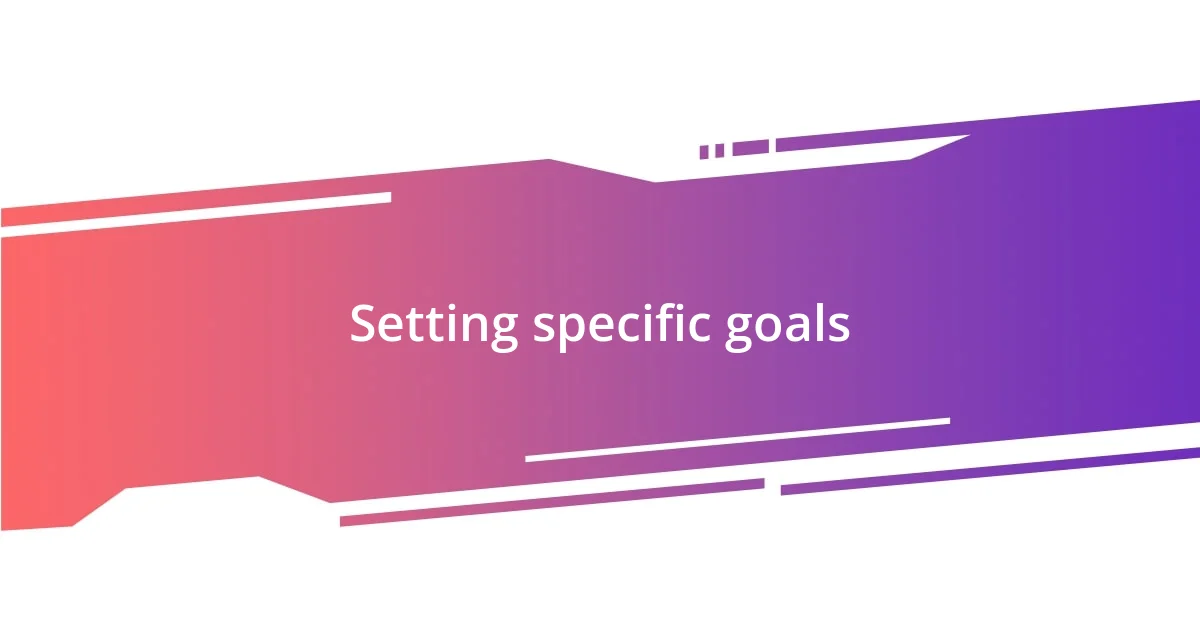
Setting specific goals
Setting specific goals is a game changer in my approach to exploring new techniques. Whenever I embark on a new learning journey, I find that having clear, measurable objectives acts like a compass guiding my path. For instance, a while back, I set a goal to improve my public speaking skills by participating in at least three local meetups. The moment I defined this target, it didn’t just motivate me; it also helped me strategize how I could make the most of those opportunities. Have you ever noticed how having a solid plan can elevate your commitment?
Breaking down my overarching goals into smaller, achievable milestones is something I cherish. Recently, while learning to code, I decided to master one programming concept per week. This approach kept me from feeling overwhelmed and allowed me to celebrate little victories along the way. Each completed milestone sparked a sense of accomplishment that pushed me forward. So, do you think focusing on small wins can change your perspective on long-term ambitions?
I also tend to reflect on my goals regularly. I like to ask myself if they’re still relevant or if I need to tweak them based on my evolving interests. During a self-review, I realized my initial goal of mastering video editing felt rigid and limiting. By adjusting it to “create three short films by the end of the month,” I infused a sense of creativity and excitement into my learning process. This shift not only reignited my passion for storytelling but also made the journey gratifying. How often do you reassess your goals to ensure they still resonate with you?
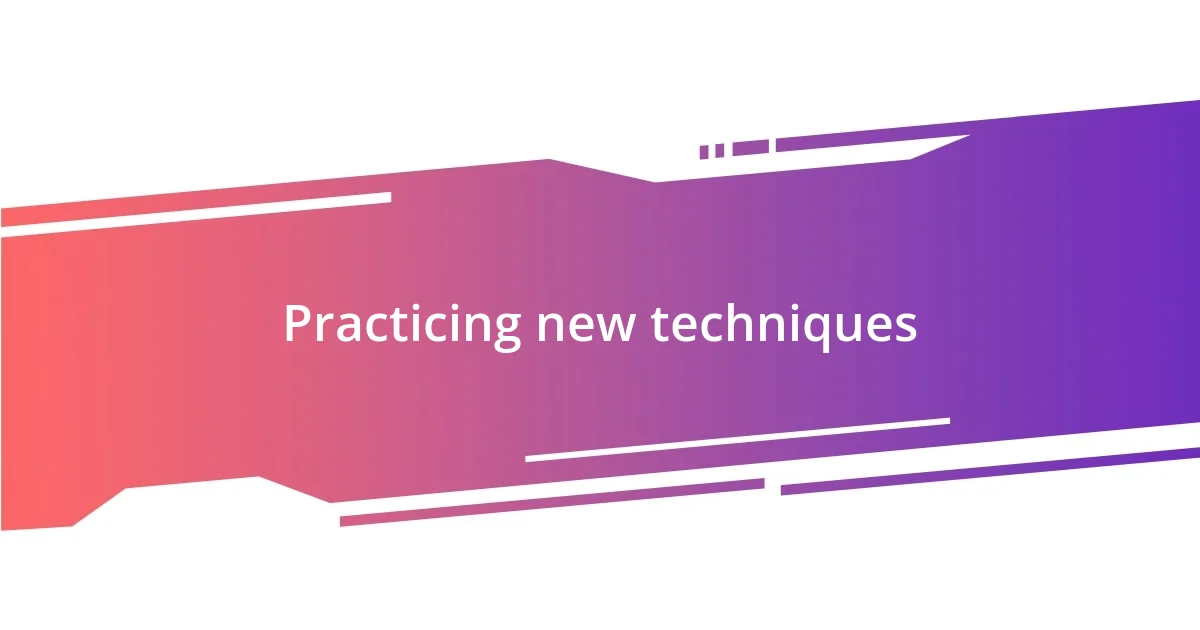
Practicing new techniques
Practicing new techniques feels like a dance between excitement and uncertainty. When I’m eager to learn something new, I often allocate specific time slots in my schedule for practice, treating it as an important appointment. I recall the first time I tried my hand at watercolor painting; I set aside two hours every Saturday morning to explore brush techniques and color blending. Each session was an invitation to experiment, and despite some early mishaps, the joy of progress kept me coming back for more. Have you ever felt that thrill of trying something new, despite the initial stumbles?
As I practice, I find that reflection plays a crucial role in my growth. After each session, I jot down notes about what worked and what didn’t. One time, while learning a new guitar riff, I recorded myself playing to catch any mistakes. Listening back revealed tiny flaws I hadn’t noticed in the moment, allowing me to refine my technique. This insight made me wonder—how often do we overlook the importance of self-assessment in our learning journeys?
Collaboration also enriches my practice experience. Engaging with a friend during a technique trial not only makes the process more enjoyable but also opens up avenues for feedback. Just last month, I was practicing my cooking skills, and inviting a friend to join me transformed it into a hands-on workshop. We shared tips, quickened each other’s pace, and even laughed over a few kitchen mishaps. Isn’t it amazing how sharing the experience can elevate our learning?
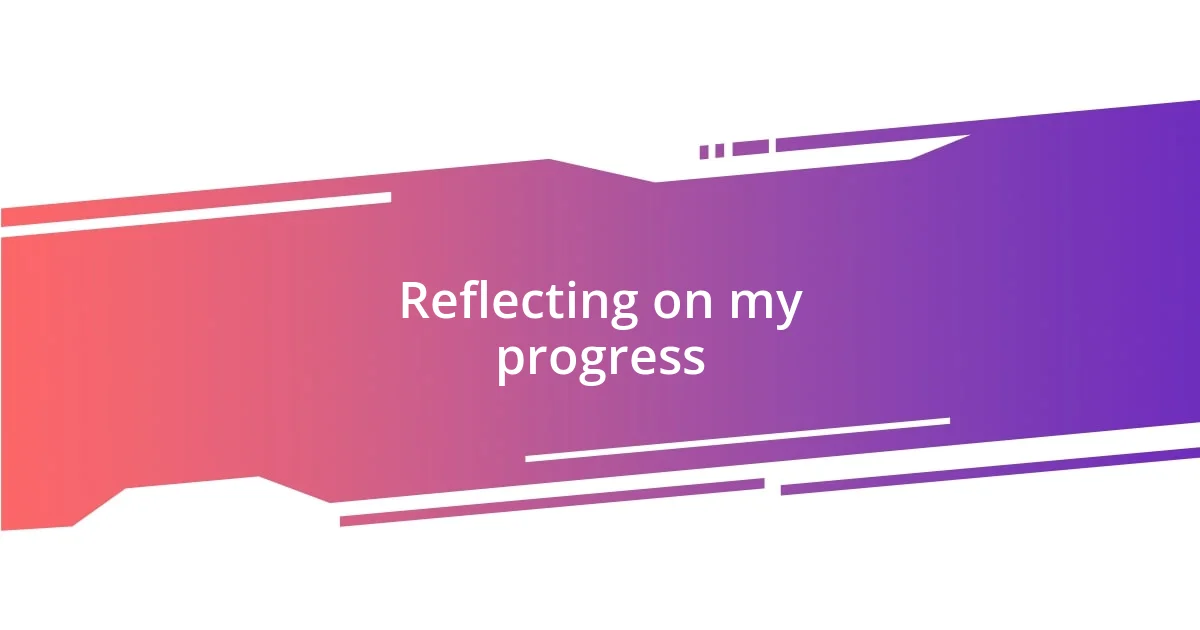
Reflecting on my progress
Reflecting on my progress has become an essential part of my learning process. I often set aside time each month to look back and assess where I am. Just last week, I found myself revisiting my initial attempts at playing the ukulele. It was eye-opening to see how far I’ve come since those first awkward chords. Have you ever been surprised by your own growth when you take a moment to pause and reflect?
During my reflections, I also consider the feelings behind my achievements. I remember the rush of joy the first time I strummed a song flawlessly after weeks of practice. That moment was not just a win in skills; it was a victory over my self-doubt that lingered during earlier attempts. When I connect my progress to emotional milestones like these, it fuels my motivation to keep going. Does acknowledging your emotional journey enhance your commitment to learning?
Sometimes, those reflections lead me to unexpected revelations. Like when I realized that my struggle with juggling multiple creative outlets was stifling my growth in each area. This insight encouraged me to focus on one technique at a time for a month, and the clarity made all the difference. What insights have you discovered about yourself through reflecting on your own progress?
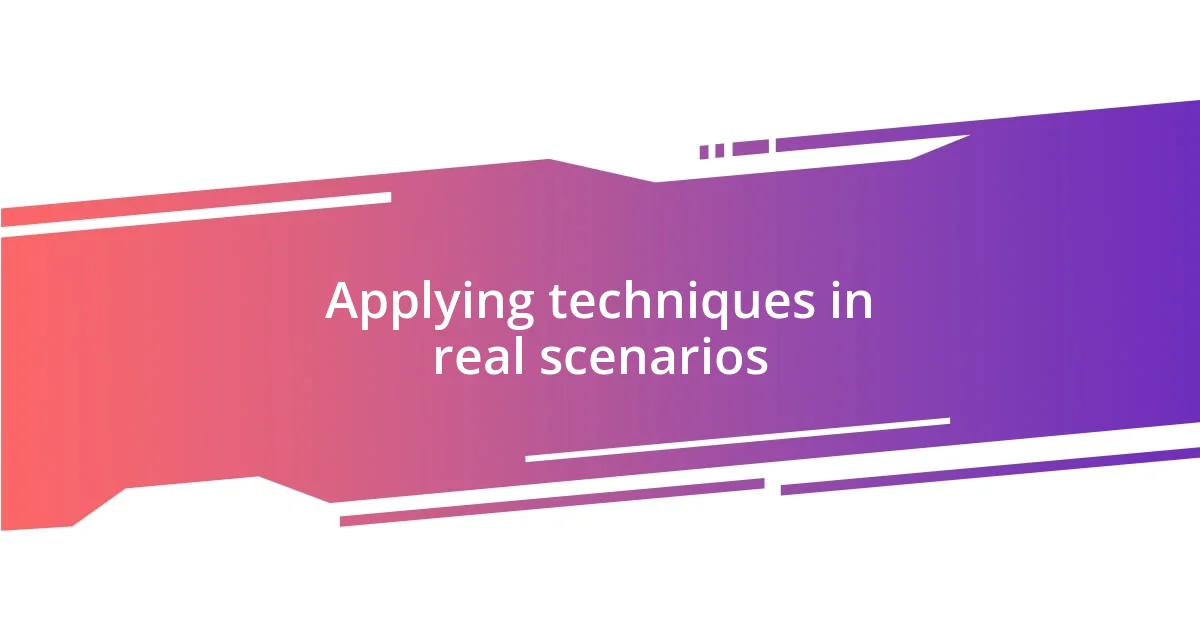
Applying techniques in real scenarios
When I apply new techniques in real scenarios, I often feel a blend of anticipation and nerves. For instance, the first time I incorporated visualization into my running routine, I stood at the starting line with heart and breath quickening. Imagining each mile as I ran transformed my mindset, making the experience more about enjoyment and less about endurance. Have you ever tried picturing your success before diving into a challenge? It’s a game-changer!
There’s an undeniable magic that happens when theory meets practice. Recently, I experimented with a new public speaking technique where I practiced storytelling to engage my audience better. During a community event, I took that leap, sharing a personal story about a travel mishap that turned into a humorous adventure. The laughter and connection I felt from the audience reminded me that applying techniques is not just about delivering information; it’s about creating memorable moments together. Isn’t it fascinating how sharing our experiences can spark connection?
Every time I apply a newly learned technique, I encounter opportunities for growth. In an attempt to improve my photography skills, I decided to shoot in manual mode during a family gathering. Through trial and error, I captured some stunning candid moments, but I also faced challenges with lighting that left me frustrated. However, each misstep offered valuable lessons, prompting me to rethink my approach. Do you find that encountering difficulties during practice can ultimately lead to profound insights about your craft?
